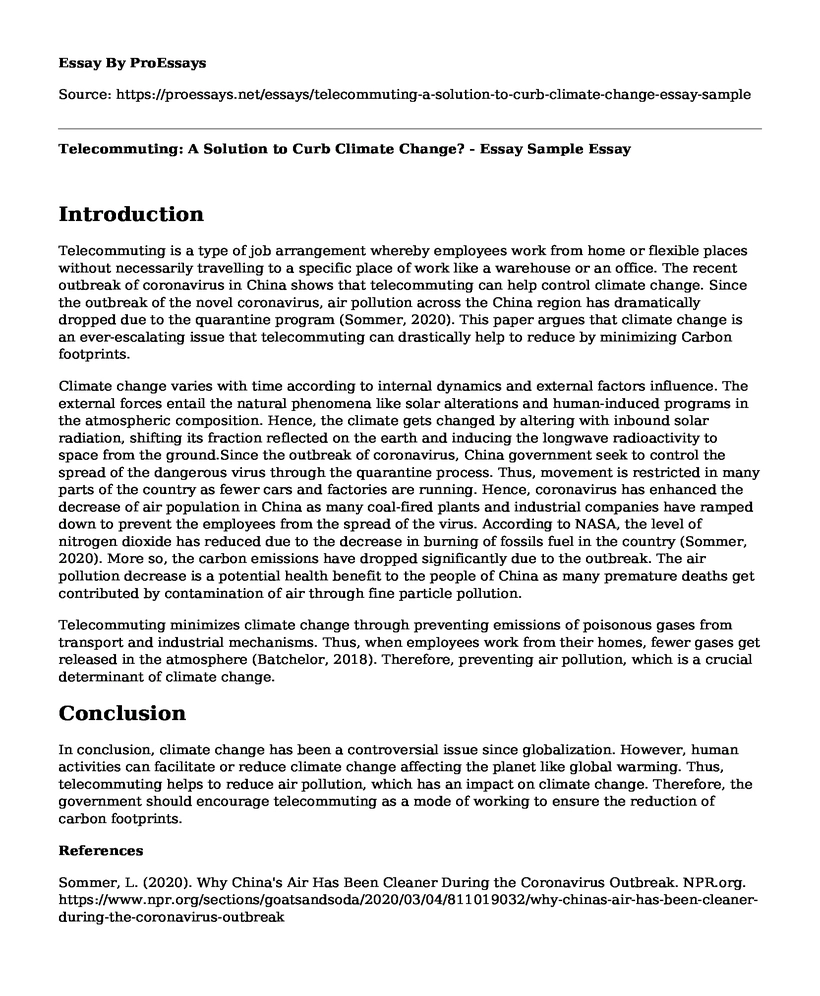Introduction
Telecommuting is a type of job arrangement whereby employees work from home or flexible places without necessarily travelling to a specific place of work like a warehouse or an office. The recent outbreak of coronavirus in China shows that telecommuting can help control climate change. Since the outbreak of the novel coronavirus, air pollution across the China region has dramatically dropped due to the quarantine program (Sommer, 2020). This paper argues that climate change is an ever-escalating issue that telecommuting can drastically help to reduce by minimizing Carbon footprints.
Climate change varies with time according to internal dynamics and external factors influence. The external forces entail the natural phenomena like solar alterations and human-induced programs in the atmospheric composition. Hence, the climate gets changed by altering with inbound solar radiation, shifting its fraction reflected on the earth and inducing the longwave radioactivity to space from the ground.Since the outbreak of coronavirus, China government seek to control the spread of the dangerous virus through the quarantine process. Thus, movement is restricted in many parts of the country as fewer cars and factories are running. Hence, coronavirus has enhanced the decrease of air population in China as many coal-fired plants and industrial companies have ramped down to prevent the employees from the spread of the virus. According to NASA, the level of nitrogen dioxide has reduced due to the decrease in burning of fossils fuel in the country (Sommer, 2020). More so, the carbon emissions have dropped significantly due to the outbreak. The air pollution decrease is a potential health benefit to the people of China as many premature deaths get contributed by contamination of air through fine particle pollution.
Telecommuting minimizes climate change through preventing emissions of poisonous gases from transport and industrial mechanisms. Thus, when employees work from their homes, fewer gases get released in the atmosphere (Batchelor, 2018). Therefore, preventing air pollution, which is a crucial determinant of climate change.
Conclusion
In conclusion, climate change has been a controversial issue since globalization. However, human activities can facilitate or reduce climate change affecting the planet like global warming. Thus, telecommuting helps to reduce air pollution, which has an impact on climate change. Therefore, the government should encourage telecommuting as a mode of working to ensure the reduction of carbon footprints.
References
Sommer, L. (2020). Why China's Air Has Been Cleaner During the Coronavirus Outbreak. NPR.org. https://www.npr.org/sections/goatsandsoda/2020/03/04/811019032/why-chinas-air-has-been-cleaner-during-the-coronavirus-outbreak
Batchelor, S. (2018). Telecommuting for the Planet. Science and Climate. https://climatechange.ucdavis.edu/what-can-i-do/telecommuting-for-the-planet/
Cite this page
Telecommuting: A Solution to Curb Climate Change? - Essay Sample. (2023, Apr 24). Retrieved from https://proessays.net/essays/telecommuting-a-solution-to-curb-climate-change-essay-sample
If you are the original author of this essay and no longer wish to have it published on the ProEssays website, please click below to request its removal:
- Global Warming: Pollution and How It Can Be Reduced Essay Example
- Relationship Between Environment and Cancers Paper Example
- Atmospheric Pollution and Other Issues Essay Example
- Annotated Bibliography on Katrina's Impact on New Orleans
- Essay Sample on Combatting the Effects of Land Pollution: A Global Challenge
- Essay Example on Global Warming: A Growing Concern in Our World
- Essay Example on Green Theory: A Framework for International Cooperation on Environmental Issues







